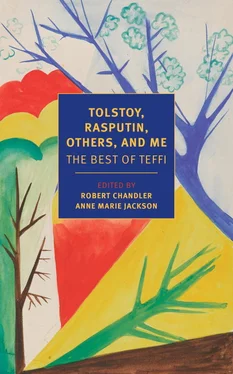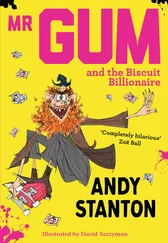Now and then there’s a brief flicker from some tremulous beam of light.
“Apparently they take bribes too! Did you know? Have you heard?”
The happy news takes wing, travelling by word of mouth—a promise of life, like “Christ is Risen!”
Bribery! The everyday, the routine, a way of life we know as our own! Something earthly and solid!
But bribery alone does not allow you to settle down and thrive.
You must run. In pursuit of your daily bread in the biblical sense of the word: food, clothing, shelter, and labour that provides these things and law that protects them.
Children must acquire the knowledge needed for work, and people of mature years must apply this knowledge to the business of everyday life.
So it has always been, and it cannot of course be otherwise.
There are heady days in the history of nations—days that have to be lived through, but that one can’t go on living in for ever.
“Enough carousing—time to get down to work.”
Does this mean, then, that we have to do things in some new way? What time should we go to work? What time should we have lunch? Which school should we prepare the children for? We’re ordinary people, the levers, belts, screws, wheels and drives of a vast machine; we’re the core, the very thick of humanity—what do you want us to do?
“We want you to do all manner of foolish things. Instead of screws we’ll have belts, we’ll use belts to screw in nuts. And levers instead of wheels. And a wheel will do the job of a belt. Impossible? Outdated prejudice! At the sharp end of a bayonet, nothing is impossible. A theology professor can bake gingerbread and a porter give lectures on aesthetics. A surgeon can sweep the street and a laundress preside over the courtroom.”
“We’re afraid! We can’t do it, we don’t know how. A porter lecturing on aesthetics may believe in the value of what he is doing, but a professor baking gingerbread knows only too well that his gingerbread may be anything under the sun—but it certainly isn’t gingerbread.”
Take to your heels! Run!
Somewhere over there… in Kiev… in Yekaterinburg… in Odessa… some place where children are studying and people are working, it’ll still be possible to live a little… For the time being.
And so on they run.
But they are few and they are becoming fewer still. They’re growing weak, falling by the wayside. They’re running after a way of life that is itself on the run.
And now that the motley herd has wandered onto the Gadarene cliff for its final leap, we can see how very small it is. It could be gathered up into some little ark and sent out to sea. But there the seven unclean pairs would devour the seven clean pairs and then die of overeating. [2] An allusion to Genesis vii, where God tells Noah, “Of every clean beast thou shalt take to thee by sevens, the male and the female: and of beasts that are not clean by two, the male and the female.” In the biblical story, the beasts do not devour one another.
And the souls of the clean would weep over the dead ark:
“It grieves us to have suffered the same fate as the unclean, to have died together with them on the ark.”
Yes, my dears. There’s not much you can do about it. You’ll all die together. Some from eating, some from being eaten. But “impartial history” will make no distinction. You will all be numbered together.
“And the entire herd plunged from the cliff and drowned.”
March 1919 Translated by Anne Marie Jackson
Part IV
ARTISTS AND WRITERS REMEMBERED
I remember… I’m nine years old.
I’m reading Childhood by Tolstoy. Over and over again.
Everything in this book is dear to me.
Volodya, Nikolenka and Lyubochka are all living with me; they’re all just like me and my brothers and sisters. And their home in Moscow with their grandmother is our Moscow home; when I read about their drawing room, morning room or classroom, I don’t have to imagine anything—these are all our own rooms.
I know Natalya Savishna, too. She’s our old Avdotya Matveyevna, Grandmother’s former serf. She too has a trunk with pictures glued to the top. Only she’s not as good-natured as Natalya Savishna. She likes to grumble. “Nor was there anything in nature he ever wished to praise.” So my older brother used to sum her up, quoting from Pushkin’s “The Demon”.
Nevertheless, the resemblance is so pronounced that every time I read about Natalya Savishna, I picture Avdotya Matveyevna.
Every one of these people is near and dear to me.
Even the grandmother—peering with stern, questioning eyes from under the ruching of her cap, a bottle of eau de cologne on the little table beside her chair—even the grandmother is near and dear to me.
The only alien element is the tutor, Saint-Jérôme, whom Nikolenka and I both hate. Oh, how I hate him! I hate him even more and longer than Nikolenka himself, it seems, because Nikolenka eventually buries the hatchet, but I go on hating him for the rest of my life.
Childhood became part of my own childhood and girlhood, merging with it seamlessly, as though I wasn’t just reading but truly living it.
But what pierced my heart in its first flowering, what pierced it like a red arrow was another work by Tolstoy— War and Peace .
I remember…
•
I’m thirteen years old.
Every evening, at the expense of my homework, I’m reading one and the same book over and over again— War and Peace .
I’m in love with Prince Andrei Bolkonsky. I hate Natasha, first because I’m jealous, second because she betrayed him.
“You know what?” I tell my sister. “I think Tolstoy got it wrong when he was writing about her. How could anyone possibly like her? How could they? Her braid was ‘thin and short’, her lips were puffy. No, I don’t think anyone could have liked her. And if Prince Andrei was going to marry her, it was because he felt sorry for her.”
It also bothered me that Prince Andrei always shrieked when he was angry. I thought Tolstoy had got it wrong here, too. I felt certain the Prince didn’t shriek.
And so every evening I was reading War and Peace .
The pages leading up to the death of Prince Andrei were torture to me.
I think I always nursed a little hope of some miracle. I must have done, because each time he lay dying I felt overcome by the same despair.
Lying in bed at night, I would try to save him. I would make him throw himself to the ground along with everyone else when the grenade was about to explode. Why couldn’t just one soldier think to push him out of harm’s way? That’s what I’d have done. I’d have pushed him out of the way all right.
Then I would have sent him the very best doctors and surgeons of the time.
Every week I would read that he was dying, and I would hope and pray for a miracle. I would hope and pray that maybe this time he wouldn’t die.
But he did. He died. And died again.
A living person dies once, but Prince Andrei was dying forever, forever.
My heart ached. I couldn’t do my homework. And in the morning… Well, you know what it’s like in the morning when you haven’t done your homework!
Finally, I hit upon an idea. I decided to go and see Tolstoy and ask him to save Prince Andrei. I would even allow him to marry the Prince to Natasha. Yes, I was even prepared to agree to that—anything to save him from dying!
I asked my governess whether a writer could change something in a work he had already published. She said she thought he probably could—sometimes writers make amendments in later editions.
Читать дальше












